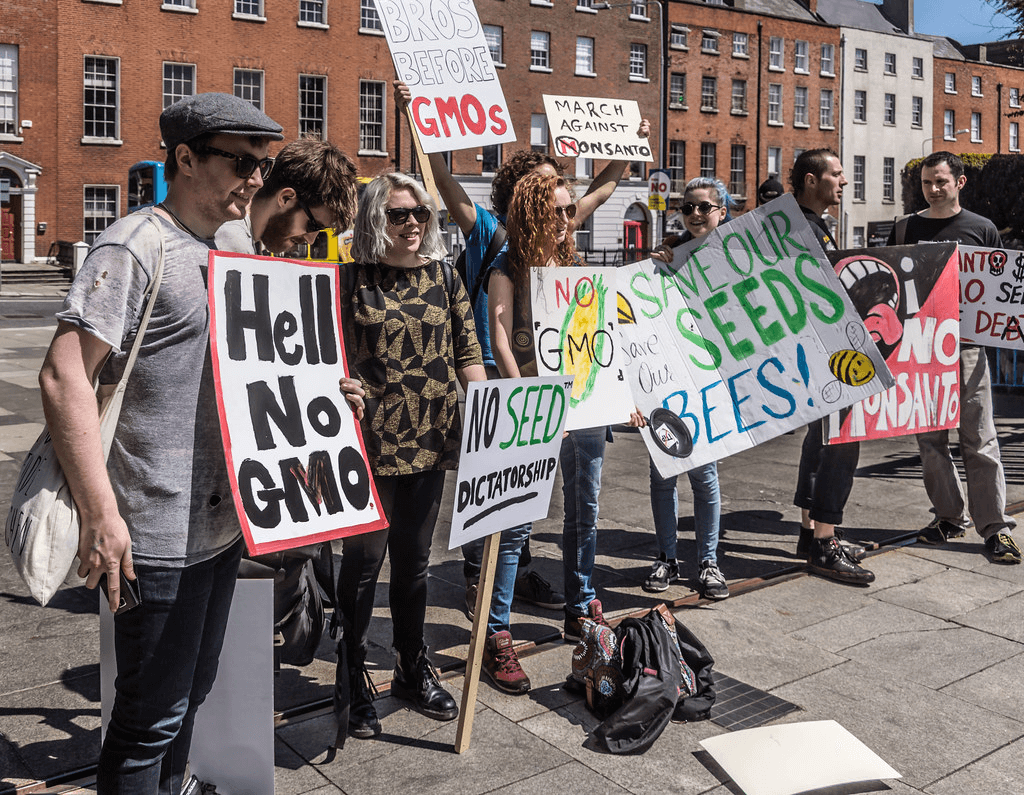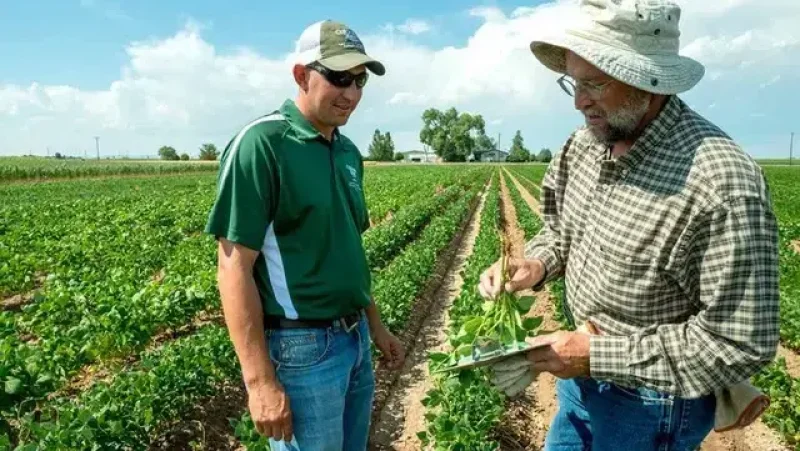Staunch opponents of the agricultural biotechnology revolution spin a narrative that large agribusiness have strong-armed governments to approve genetically modified crops and brainwashed farmers to grow them. In the countries where GM crops are widely grown — Argentina, Australia, United States, Brazil and Canada — advocacy groups claim corporations spread disinformation about their safety and sustainability benefits. In their view, farmers are pawns of corrupt and immoral corporations that are conducting a vast scientific experiment, driven by greed and without regard to global health or environmental costs.
This rejectionist narrative is so strong that some governments are backing away from GM technology altogether. Mexico was an early adopter, approving its first GM crop, soybeans, in 1996, followed by corn and cotton. But bowing to pressure from advocacy groups and indigenous activists, the country revoked its approval of soybean in 2017 and froze the introduction of new GM cotton seeds in 2019.
And now Mexico and the US are in the midst of an escalating trade dispute over President Andrés Manuel López Obrador’s ban of US-grown GM corn for human consumption — no more tortillas made with US transgenic corn — and is phasing in a ban of imported GM corn used for animal feed. Mexico buys about $5 billion worth of US feed corn annually, almost all of it genetically modified. Obrador says GM seeds can contaminate Mexico’s age-old native varieties and could pose yet unknown human health dangers.
According to Reuters, US Agriculture Secretary Tom Vilsack rejected Mexico’s demand that the countries US “work together” on new scientific studies to address his safety and health concerns.

“They did not want to establish a period in which the parties agree to carry out impact studies on animal health and human health,” said Deputy Agriculture Minister Victor Suarez. “Their science is the Word of God. That is not science, that is ideology.”
The consensus that GM crops are safe is not based on belief or ideology; it is an overwhelming science consensus. To date there have been more than 3,000 studies by 280+ independent agencies assessing the health, safety and sustainability of GM crops, and all of have that food grown from GM seeds are as safe or safer than conventional or organic foods. As the European Commission has written about the studies it commissioned:
The main conclusions to be drawn from the efforts of more than 130 research projects, covering a period of more than 25 years of research, and involving more than 500 independent research groups, is that biotechnology, and in particular GMOs, are no more risky than conventional plant breeding.
A ban could devastate US farmers. Mexico is the largest export market for US corn, accounting for $5 billion, about 27% of all corn exports. About 20 percent of US corn exported to Mexico is for human consumption and the rest for animal feed. Ninety percent of it is genetically modified.
What do farmers think?
According to Suarez and the anti-GMO groups that support his rejectionist policy, most farmers in his country have no interest in growing crops from biotech-engineered seeds. They reject growing it as a matter of ‘food sovereignty.’ They claim that in countries where large numbers of farmers are use GM seeds only under duress.
This is a condescending attitude towards farmers. There is no evidence that “most farmers” reject agrobiotechnology. In almost every country that bans all or some GM crops — India and China most notably — a black market has developed to circumvent government restrictions.
Farmers are desperate for any tool that can help increase yields and protect against disease. Every day they go to war with mother nature, which is anything but benign. They must deal with crop diseases, drought, the rollercoaster ride of commodity prices and the cost of necessary farm inputs such as diesel for their tractors and fertilizers to grow crops. They want to utilize the most efficient means of farming with the least environmental impact.
What about claims by anti-GMO groups that GM seeds unfairly restrict farmers’ choices? In fact, farmers have a wide variety of seed options available to them, including organic, hybrid, conventional and genetically modified seeds. Those farmers that have the freedom to choose to grow GMO crops do so not because they are brainwashed or manipulated by big agribusiness but because it is in their best interests to do so.

Studies in this regard support claims that GM crops help the environment and farmers. A meta-analysis of 147 studies released in 2018 indicated that growing GMO crops reduces chemical pesticide use by 37%, increases crop yields by 22%, and lifts farm profits by 68%.
Organic seed sales represent less than 8% of the overall market, expected to top $92 billion by 2028. The fact that organic farming represents such a small portion of the crops grown in the world is an indication that it is a method of farming that does not appeal to most farmers.
In the organic-friendly EU, only 9.1 percent of the farmland area in 2020 was organic. As of 2018 in the US, certified organic products made up just 5.7 percent of all food sold through retail outlets. In Canada, certified organic production accounted for only 3.3% of all fruit and vegetables sold in 2021.
Organic food movement allies with anti-GMO activists
Farmers in much of the world will soon have a greater selection of genetically engineered seeds designed to increase yield, protect against crop diseases. and ease threats posed by climate change: gene-edited crops. Numerous countries, including the US, Canada, UK and Japan, are embracing new genomic techniques (NGTs), including CRISPR. In many cases these tools are more efficient than GMO crops; technology rejectionists are determined to derail these advances.
Europe is the current battleground. On July 5, the European Commission issued a report years in the making recommending reversing parts of a 22-year-old law that effectively bans almost all agrobiotechnology innovation. The Commission urged the EU to deregulate NGTs and to treat them going forward as conventional crops — in other words, there would be no labelling or traceability requirements for most NGT crops. Not unexpectedly, organic organizations around the world allied with Europeans Greens and GM rejectionist groups to protest the recommendations, hoping to pressure the European Council into preserving the status quo that effectively bans biotechnology innovation in farming.
The European umbrella organization lobbying for organic farming, IFOAM Organics Europe, called the recommendation to deregulate most new genomic techniques as “misguided, dangerous for European seed autonomy and a distraction from the agroecological solutions needed to move agriculture toward sustainability…“ This is a bad day for the European model of a diverse farming and breeding sector.”
Would these proposed reforms damage Europe’s “diverse farming model”?
The organic lobby argues that its mode of farming is more environmentally sustainable than conventional agriculture. But that is not the case. Organic farmers generally use less-toxic chemicals and pay closer attention to soil health, nutrients and microbial activity. But from a 360 sustainability perspective, there is no contest. Multiple studies show that non-organic farming yields considerably more food with lower costs and in some cases fewer inputs per acre. GM crops often use less water; don’t require tilling, which releases greenhouse gases; and some crops, such as insect-resistant Bt corn, soybean, cotton and eggplant, require less chemical pesticides than their organic counterparts.
Recent independent studies agree. In 2016, the Belgian research institute VIB released a report quantifying the impact of GMOs on the environment. It concluded:
Insect-resistant crops have resulted in a 230 million kg decrease in the use of insecticides. Herbicide-tolerant crops have led to reductions in fuel use and CO2 emissions of 6.3 billion liters and 16.8 million metric tons respectively, by supporting no-till farming. Overall, GM crops have produced an environmental benefit of 37%.
In 2018, a Nature study by a team of scientists from the US, Germany, France and Sweden found that organic farming produces far more greenhouse gases than conventional agriculture. This is because organic growers must farm more land to produce the same amount of food as conventional farmer; the yield lag is estimated at 40%. The researchers developed a new metric called Carbon Opportunity Cost to estimate the effect of greater land use on climate change. They found that organic production has as much as a 70 percent greater greenhouse gas impact.
Those findings were attacked by the US-based organic-funded Rodale Institute and by other organic groups but have been validated by multiple subsequent studies. In 2019, scientists at the Royal Agricultural University in the UK, writing in Nature Communications, concluded that if all farms in England and Wales converted to organic production, greenhouse gas emissions would double and yields would decline by half.
An analysis in the MIT Technology Review noted, “It would force ”hungry Britons to import more food from overseas. If half the land used to meet that spike in demand was converted from grasslands, which store carbon in plant tissues, roots and soil, it would boost overall greenhouse-gas emissions by 21%.”
“The key message from my perspective is that you can’t really have your cake and eat it,” said co-author Laurence Smith, who was part of the team that performed the analysis.
Ignoring the unvarnished sustainability facts, many organic proponents remain ideologically opposed to reconsidering their rejectionist views. “Historically, the relationship between organic agriculture and biotechnology has been antagonistic,” notes a 2022 study in the journal Frontiers in Bioengineering and Biotechnology.
This antagonism induced many smallholder farmers to believe that there is a complete incompatibility between the two agricultural systems. This struggle resulted in a legal framework for organic farming that prevents farmers from incorporating GMOs into their production systems, even if it would allow for better quality, increased climate-related resilience, and productivity, and even less use of pesticides.
What do EU farmers want?
Challenging the organic food lobby propaganda line that biotechnology is about to be foisted on the EU, many farmers eagerly await the pending regulatory liberalization. They know if they are not allowed to use NGTs, EU agriculture will be left in the dust by those nations who are adopting them.
“Italy’s farmers’ associations (Coldiretti, Confagricoltura, and CIA) … stressed how innovative biotechnologies might help preserve and enhance Italy’s biodiversity, while fostering the sustainability and competitiveness of the agriculture sector,” reads the most recent USDA Biotechnology Report for Italy.
Farmers in the Netherlands seem equally embracing of new seed technologies, according to the USDA. “The Dutch Farmers Organization (known as the LTO) … states that farmers want to be less dependent on chemicals and invest in robust agricultural systems, with the DNA of the plant as a basic element. The LTO argues that innovative biotechnologies are an important tool to breed resistant varieties, and must be deregulated.”
Spain’s farmer associations are in favor of planting GE crops,” the USDA analysis found. “The use of agricultural technologies, such as biotechnology or irrigation systems, to improve competitiveness and obtain consistent output levels are positively perceived and defended by a large majority in the farming sector.”
A broad coalition of farmers is also emerging in Sweden, Lithuania, Malta, Ireland, Hungary, Romania, Belgium, and The Czech Republic. “The existing framework is a “limitation” for European farmers that causes a “brain drain to countries outside of the EU,” Czech agriculture minister Zdenek Nekula has said. “EU farmers could be helped by “using innovation…. We need to support new genomic techniques and breed new varieties.”
Underscoring the broadening of the ‘deregulate agrobiotechnology’ movement now spreading through Europe, young farmers are demanding tools that can address the increasing number of climate disruptions.
“The droughts of 2022 and previous years, the higher frequency and intensity of adverse weather events, and the overall uncertainty for farmers as the climate crisis worsens all call for tools that would benefit the environment and bolster the socio-economic resilience of farms,” notes Diana Lenzi, President of the European Council of Young Farmers.
Why the change in attitudes in recent years? The dual threats of climate change and deteriorating global food security, said Lenzi:
New Genomic Techniques (NGTs) could support farmers in their environmental action, by improving nitrogen efficiency, reducing the sector’s carbon footprint and producing plants that require less water, fertilizers and plant protection products. Such technology could benefit biodiversity and help mitigate climate change while also improving the economic health of farms by requiring less inputs and guaranteeing more certainty and increased resilience to pests and other hazards. It is also possible that NGTs could improve the nutritional quality of certain products, for example by reducing toxins and allergens, or help preserve traditional varieties that have been impacted severely by climate change.
Many plant scientists have fled the EU to scientifically hospitable countries more open to agricultural biotechnology. Venture capital in the crop gene-editing space has dried up.
If the EU does not act quickly, fearmongers will delay the adoption of NGTs, severely handicapping its farmers, establish Europe as a laggard in food production and hamper global efforts to reduce greenhouse gases.
What will be at stake for the European Union when the New Genomic Techniques reform bill comes up for debate? Nothing less than the viability and competitiveness of EU agriculture.
Steven E. Cerier is a retired international economist and a frequent contributor to the Genetic Literacy Project.































